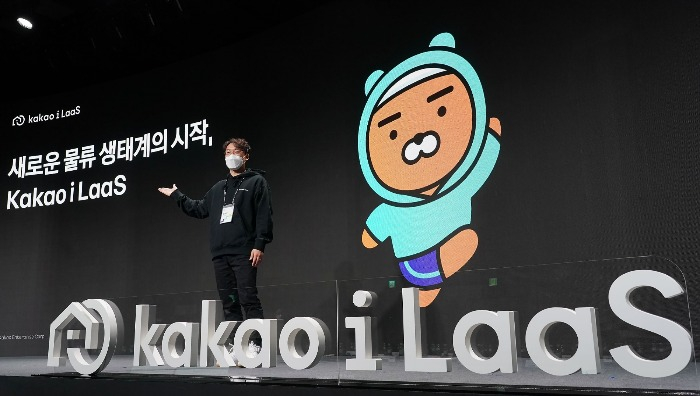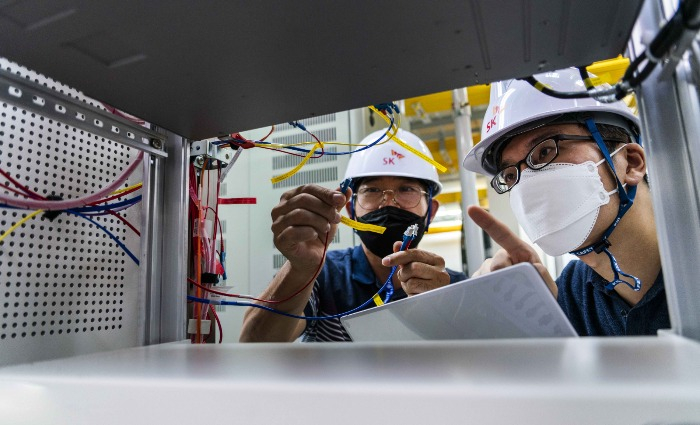Kakao joins race to become private 5G network provider
The specialized network is faster and more stable than the public network, making it ideal for building smart offices and factories
By Sep 05, 2022 (Gmt+09:00)
LG Chem to sell water filter business to Glenwood PE for $692 million


Kyobo Life poised to buy Japan’s SBI Group-owned savings bank


KT&G eyes overseas M&A after rejecting activist fund's offer


StockX in merger talks with Naver’s online reseller Kream


Mirae Asset to be named Korea Post’s core real estate fund operator



Kakao Enterprise Corp. is poised to become a private 5G network provider, for use within the parent company Kakao Corp. and for serving outside clients.
The Ministry of Science and ICT is reviewing the company’s application for providing the next-generation network services and will likely approve it before the end of this month, according to industry insiders.
Kakao Enterprise is the artificial intelligence-based business-to-business (B2B) affiliate of the South Korean tech giant.
The specialized network is faster and more stable than the public network, making it ideal for smart factories and other plants where high-speed internet is a must. As such, Kakao is forecast to utilize the services for building smart offices, R&D centers, data centers, and AI-based logistics centers.
The demand for private 5G networks has been skyrocketing in recent years on the back of rapid digital transformation (DX) across the board.
GROWING COMPETITION
Many eligible South Korean conglomerates are salivating at the growing market.
But existing network service providers are not allowed to enter the specialized sector, according to the regulations.
Naver Cloud Corp., the cloud arm of Naver Corp., was the first to be selected as a private 5G network operator last December.
At end of March 2022, LG CNS Co. followed suit.
Including the first two, a total of five companies have entered the market so far this year.
Three new players including Kakao are widely expected to receive approval from the science ministry later this month.
The Samsung Group is also interested.
At the last month’s 5G specialized network conference, a Samsung SDS Co. employee told the press that the company is gearing up for starting the business.
Some industry insiders predict that Samsung Electronics Co. itself could step up to become the network provider for the umbrella group.

THE BRIGHT SIDE
The private 5G network for corporations uses the frequency bands of 28GHz band with 500MHz width (28.9GHz - 29.4GHz) and 4.7GHz band with 100MHz width (4.72GHz - 4.82GHz).
While the frequencies’ scope of reach is narrower than that of public 5G, the specialized network is highly regarded as being faster and more stable.
With the increasing demand for digital transformation, market research firm Grand View Research forecasts the market for private 5G networks worldwide would grow from the last year’s $1.38 billion to $14.3 billion by 2028.
LG CNS is enjoying the first mover advantage and using the private 5G network to detect faulty products at the LG Innotek Gumi Factory 2 and is in the process of converting the factories into smart factories.
But South Korean companies are also jonesing to serve outside the respective business groups.
Nable Communications Inc. is slated to provide a number of services to the Ewha Woman's University Mokdong Hospital utilizing the faster network, including AI-powered augmented reality (AR) surgeries.

SK Networks Co., for its part, will incorporate the faster network and robotics into its logistics services provided to The Food Industry Promotional Agency of Korea and the Robotland Foundation in South Gyeongsang Province.
Experts say that the lack of smartphones and tablets exclusively made to be compatible with the private 5G networks is a big challenge.
To address this concern, the science ministry is scheduled to provide a roadmap for expanding the private 5G network in October.
“The specialized network is indispensable to developing the 5G convergence industry,” Chang Kyung-hi, professor at Inha University’s department of electrical engineering said.
Chang, who also serves as the executive chairman of 5G Forum, stressed that the industry needs more providers in various sectors.
Write to Jeong-Soo Hwang at hjs@hankyung.com
Jee Abbey Lee edited this article.
-
 Tech, Media & TelecomS.Korea’s 5G, cryptography likely to be adopted as global standards
Tech, Media & TelecomS.Korea’s 5G, cryptography likely to be adopted as global standardsJul 18, 2022 (Gmt+09:00)
1 Min read -
 Artificial intelligenceNaver to enter smart building market with 5G, AI robots
Artificial intelligenceNaver to enter smart building market with 5G, AI robotsJun 08, 2022 (Gmt+09:00)
2 Min read


